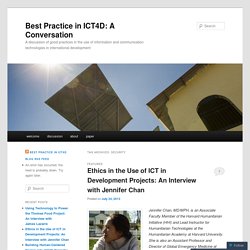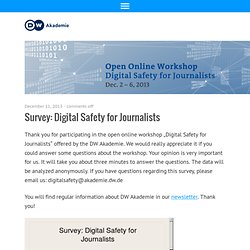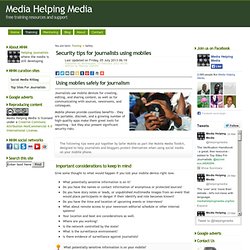

Best Practice in ICT4D: A Conversation. Jennifer Chan, MD/MPH, is an Associate Faculty Member of the Harvard Humanitarian Initiative (HHI) and Lead Instructor for Humanitarian Technologies at the Humanitarian Academy at Harvard University.

She is also an Assistant Professor and Director of Global Emergency Medicine at Northwestern University’s Feinberg School of Medicine. Her recent activities have focused on humanitarian technologies and crisis mapping with a focus on field operations. As a consultant, she helps evaluate open source technology organizations such as Ushahidi, trains emerging practitioners in humanitarian technologies, and researches the interface between humanitarian agencies and volunteer & technical communities.
Q: Can you tell us a bit about your work at the intersection of technology and humanitarian assistance? A: The area of work I’ve focused on over the past couple of years is commonly referred to as crisis mapping in the field of humanitarian technology. A: To some degree, yes, and to some degree no. Open Online Workshop – Safety For Journalists. Thank you for participating in the open online workshop „Digital Safety for Journalists“ offered by the DW Akademie.

We would really appreciate it if you could answer some questions about the workshop. Your opinion is very important for us. It will take you about three minutes to answer the questions. The data will be analyzed anonymously. If you have questions regarding this survey, please email us: digitalsafety@akademie.dw.de You will find regular information about DW Akademie in our newsletter. The Digital Safety team says: Thank you! Thanks so much to all of our participants for helping make DW Akademie’s ‘Digital Safety for Journalists’ open online workshop so successful.
With a panel discussion, five live online sessions and numerous posts on digital safety topics, we hope you have a better understanding of why digital security is important for journalists and what you can do to work more safely in the digital realm. Until next year, Your Digital Safety Team Watch out!
10 New Year’s Resolutions to Browse the Internet Safely in 2013. At Global Voices Advocacy (GVA), we are dedicated to defending freedom of expression online.

We have always been keen on publishing guides and tools to help our fellow netizens navigate the internet safely, circumvent censorship and protect themselves online. That is why, in 2013, we are committed to continue to defend your rights as netizens by publishing original reports and a new series of guides covering areas as diverse as circumvention, anonymity, surveillance, privacy, citizen journalism, visualization, online activism and advocacy. As 2012 draws to a close, dear reader, here at team Advox, we've decided to suggest 10 resolutions for 2013, presented in the form of a review of the tools and strategies to protect yourself online. This is a selection of the best ways and methods we've come across in 2012.
Remember that no one tactic will ever provide you with 100% security and safety online. . #1 – Hide your identity when using your mobile #2 – Learn good mobile reporting practices. Security tips for journalists using mobiles. Security tips for journalists using mobiles Details Last Updated on Friday, 05 July 2013 06:19 Published on Wednesday, 15 February 2012 00:00 Written by Melissa Ulbricht Journalists use mobile devices for creating, editing, and sharing content, as well as for communicating with sources, newsrooms, and colleagues.

Mobile phones provide countless benefits - they are portable, discreet, and a growing number of high-quality apps make them great tools for reporting - but they also present significant security risks. The following tips were put together by Safer Mobile as part the Mobile Media Toolkit, designed to help journalists and bloggers protect themselves when using social media on your mobile phone. A User Guide to Orbot – Anonymized Tor Browsing on Your Mobile Phone. A User Guide to Orbot – Anonymized Tor Browsing on Your Mobile Phone 10 Oct 2011 by melissaloudon Orbot is an anonymizing and circumvention app that connects Android phones to the Tor network. Developed by The Guardian Project, it is currently the only way to use Tor on a mobile phone. Who should use it? Orbot is for Android users who need to browse anonymously or circumvent blocked sites. How does it work? Orbot sets up a connection to the Tor network and makes it available to apps through a local proxy.
For anonymous web browsing, you also need a browser app that can route your communications through a proxy. Public Key Cryptography: Diffie-Hellman Key Exchange. Me and my Shadow. What are digital shadows and why do they matter?